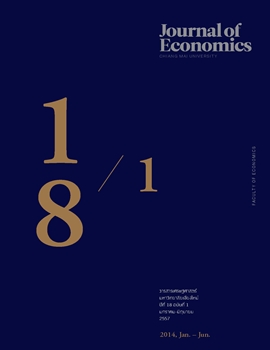อาชีพ และ ความสุข: กรณีศึกษาจังหวัดพะเยา
คำสำคัญ:
ความสุข, ความสุขเชิงอัตวิสัย, พะเยา, Happiness, Subjective–wellbeing, Phayaoบทคัดย่อ
การศึกษาครั้งนี้ศึกษาปัจจัยที่มีผลต่อความสุขของกลุ่มอาชีพ ข้าราชการ อาชีพเอกชนทั่วไปและอาชีพเกษตรกรรม ในพื้นที่ จังหวัดพะเยา จำนวน 600 คน วิเคราะห์ผลโดยใช้แบบจำลอง Ordered Logit Model ด้วยเทคนิควิธีวิเคราะห์การประมาณภาวะความน่าจะเป็นสูงสุด (Maximum Likelihood Estimates: MLE) ผลการศึกษาพบว่า ปัจจัยที่มีผลต่อความ สุขของอาชีพทั้งสามมีปัจจัยหลายด้านที่ส่งผลต่อความสุขของอาชีพทั้งสาม ซึ่งส่วนใหญ่ จะเป็นปัจจัยที่เป็นเรื่องทั่วไปและเป็นเรื่องใกล้ตัวของกลุ่มตัวอย่าง ได้แก่ การมีสุขภาพ จิตที่ดี การมีมิตรสหายที่รู้ใจ การมีความอบอุ่นภายในครอบครัว การมีความปลอดภัย ในชีวิตและทรัพย์สิน และการมีทัศนคติในความโปร่งใสของรัฐบาล ซึ่งผลการศึกษา ดังกล่าวได้สอดคล้องกับผลการศึกษาของงานทบทวนวรรณกรรมด้านความอยู่ดีมีสุข จากการศึกษาอาชีพเกษตรกรรมมีความสุขมากกว่าอาชีพข้าราชการ และความภาคภูมิใจ ในอาชีพของตนเองเป็นปัจจัยที่ส่งผลให้ความสุขของกลุ่มอาชีพเอกชนทั่วไปลดลง ผลจากการศึกษาแสดงถึงความสุขที่ลดลงจากปัจจัยความพึงพอใจในระบบประกัน สุขภาพที่ได้รับซึ่งส่งผลต่อความสุขที่ลดลงในกลุ่มอาชีพข้าราชการและในแบบจำลองที่ ได้รวมเอาอาชีพทั้งสามเข้าไว้ด้วยกัน ทั้งนี้เนื่องมาจากความคาดหวังในสิทธิของตนเอง ที่ได้รับต่อระบบประกันสุขภาพ ซึ่งปัจจัยในด้านต่างๆ เหล่านี้ส่งผลต่อความสุขแก่กลุ่ม อาชีพข้าราชการ อาชีพเอกชนทั่วไปและอาชีพเกษตรกรรม
This study tries to compare factors affecting happiness or subjective–wellbeing among civil servants, private employees, and the residual group who are mostly independent Thai farmers and small business owners. This studies use Phayao Province in northern Thailand as a case study. 600 questionnaires are collected, 200 for each scheme or each occupational group, and data are analyzed by using an ordered logit model. The results show that factors affecting happiness found from this study are consistent with what are found in the literature. Factors affecting happiness are simple things in life, which are having a good mental health, having a good friendship, having an understanding family, having security in life and assets, and perceiving that the government is transparent. The results show the residual group who are mostly independent Thai farmers and small business owners happy more than civil servants and the variable proud in career of private employees affecting happiness decrease.
The variable ”the satisfaction over the public health insurance that one is entitled to have" that factors affecting happiness in the study. It turns out that the satisfaction over the public health insurance that one is entitled to have cannot affect people’s happiness in a positive way. This result could imply that when talking about happiness, people perceive about simple things in life which are close to their hearts like family and friends. Thus, going to the hospital even though all costs are covered by the public health insurance will not make people be happier since that type of happiness should come from not having any sickness to begin with.
ดาวน์โหลด
ฉบับ
ประเภทบทความ
สัญญาอนุญาต
ข้อคิดเห็นที่ปรากฏและแสดงในเนื้อหาบทความต่างๆในวารสารเศรษฐศาสตร์มหาวิทยาลัยเชียงใหม่ ถือเป็นความเห็นและความรับผิดชอบโดยตรงของผู้เขียนบทความนั้นๆ มิใช่เป็นความเห็นและความรับผิดชอบใดๆของวารสารเศรษฐศาสตร์ มหาวิทยาลัยเชียงใหม่
บทความ เนื้อหา และข้อมูล ฯลฯ ในวารสารเศรษฐศาสตร์มหาวิทยาลัยเชียงใหม่ ถือเป็นลิขสิทธิ์เฉพาะของคณะเศรษฐศาสตร์มหาวิทยาลัยเชียงใหม่ หากบุคคลหรือหน่วยงานใดต้องการนำทั้งหมดหรือส่วนหนึ่งส่วนใดไปเผยแพร่ต่อหรือเพื่อกระทำการใดๆ จะต้องได้รับอนุญาตเป็นลายลักษณ์อักษร จากวารสารเศรษฐศาสตร์ มหาวิทยาลัยเชียงใหม่






